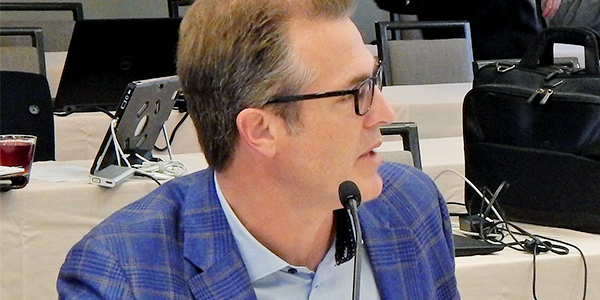By Tom Kleckner
SPP has launched an initiative to trim the number of stakeholder groups in its organizational structure, saying it will improve the RTO’s effectiveness.
Staff is currently gathering feedback from SPP members on various proposed combinations of merged working groups and committees and how best to ensure important work is not lost in the shuffle.
SPP is targeting 14 working groups and the Seams Steering (SSC) and Balancing Authority Operating (BAOC) committees. Exceptions include the committees that report to the Board of Directors and Members Committee, the Market Monitoring Unit, and the Credit Practices (CPWG) and Cost Allocation (CAWG) working groups. The CPWG reports to the Finance Committee, and the CAWG reports to the stand-alone Regional State Committee.
“With the organization’s focus on value and affordability to our stakeholders, we’re looking at a variety of potential measures to streamline processes, improve effectiveness and provide the highest degree of value possible,” SPP Vice President of Engineering Lanny Nickell said in a statement.
Nickell said the effort originated in the Value and Affordability Task Force (VATF), which was formed in January to review the cost recovery of transmission investments as well as the ongoing benefit from those investments and SPP’s operation. (See “Altenbaumer Continues to Exert his Influence” in SPP Strategic Planning Committee Briefs: Jan. 16, 2019.)
He said the task force requested an assessment of SPP’s organizational structure “that considers whether we can achieve more value by consolidating and improving coordination among groups and reducing meetings and travel across our sizeable footprint.”
Staff has been gathering feedback on four proposed combinations:
- The BAOC, SSC, Operating Reliability (ORWG) and Operations Training (OTWG) working groups
- The SSC and the Transmission, Economic Studies and Project Cost working groups
- The Business Practices, Regional Compliance, Regional Tariff, Security and System Protection and Control working groups
- The Business Practices, Change, Market and Supply Adequacy working groups
Two of the combinations involving the SSC would see the committee disbanded, with its responsibilities picked up by either the Operating Reliability, Economic Studies or Transmission working groups. Staff has also suggested in one scenario the OTWG be disbanded, with an advisory panel or the ORWG picking up its training responsibilities.
“The discussions are in the early phases,” SSC Staff Secretary Clint Savoy told his group during its July 10 meeting. “In my personal opinion, I believe we should operate as if the Seams [Steering] Committee will continue.”
Staff has also been gathering general suggestions from members on SPP’s organizational group structure. Stakeholders have suggested reducing the number of face-to-face Markets and Operations Policy Committee (MOPC) meetings and using conference calls to address less contentious Tariff changes.
The MOPC meets quarterly two weeks before the board meetings and is responsible, through its organizational groups, for developing and recommending policies and procedures related to SPP’s technical operations.
Stakeholders also suggested improving the working groups’ effectiveness by having longer meetings with more work, coordinating meetings with similar groups, creating more “meaningful, action-oriented” agendas and facilitating information sharing through focus groups.
Nickell will update MOPC on the effort during its July 16-17 meeting in Des Moines, Iowa. MOPC Chair Holly Carias, with NextEra Energy Resources, and Vice-Chair Denise Buffington, with Evergy Companies KCP&L and Westar, will also play a part in the presentation.
The VATF is to weigh in with its own feedback by July 31. MOPC is scheduled to see draft recommendations during its October meeting and the Corporate Governance Committee (CGC) in November. The CGC will then recommend changes to the board in December or January, with the changes implemented in 2020.






